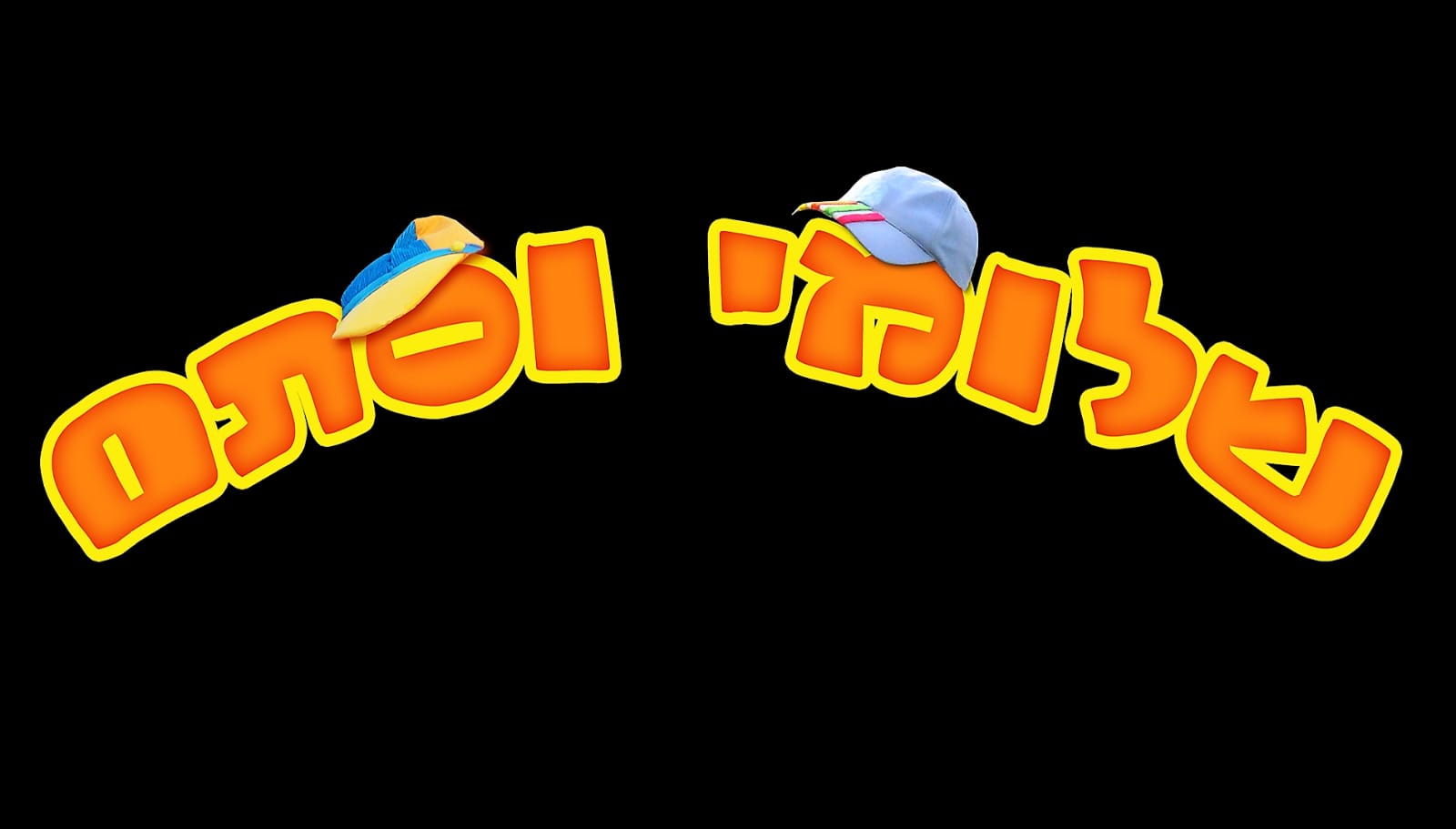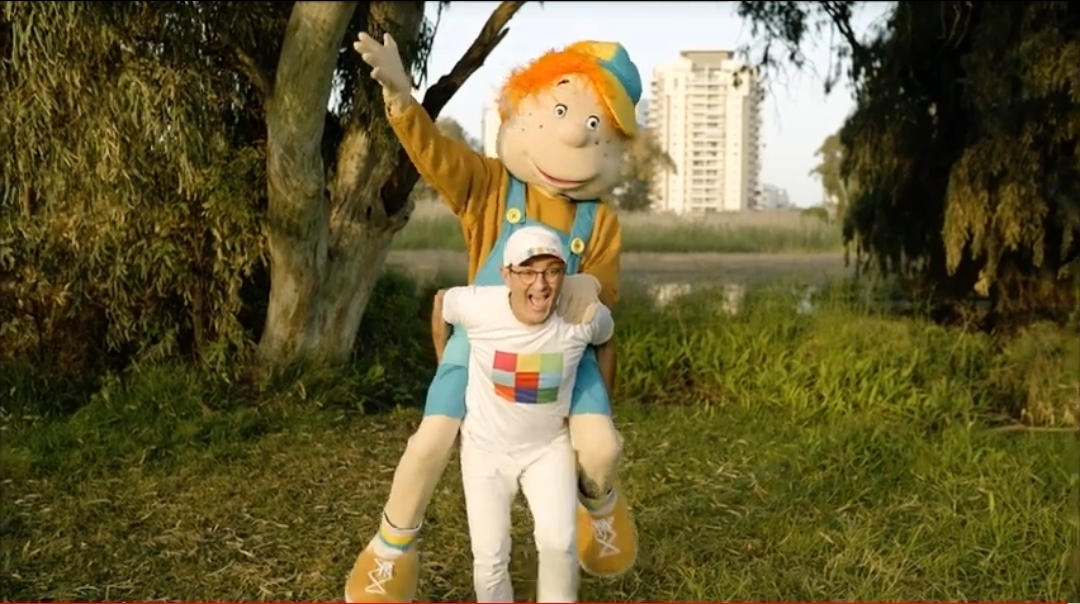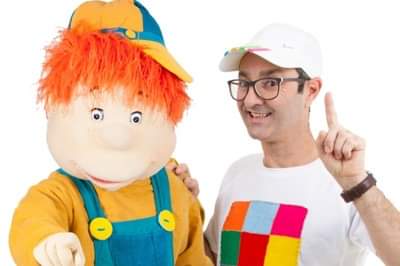Shlomi Laniado: "Just After Checking for Chametz, a Car with a Terrorist Appeared in Front of Us"
Performer known from children's shows like 'Shlomi and Stam'. What did he ask from Hashem when standing at 16 on a rooftop? How did an encounter with terrorists influence his Torah learning, and who is behind 'Stam'?
 (In circle: Shlomi Laniado)
(In circle: Shlomi Laniado)Shlomi Laniado and his giant puppet 'Stam' are a unique duo, performing for children worldwide, even in Wuhan and at Trump's grandson's kindergarten, he says with a smile. During their 'Shlomi and Stam' shows, they meet esteemed rabbis, spread love and kindness, and reveal deep emotions in hearts. "'Stam' isn't just anything, but a special character, which asks seemingly trivial questions to show it's okay not to understand, ask, or even make mistakes," Shlomi explains.
He spent most of his childhood in secular schools and wrote for various children's programs like Grandpa Tuvia and Yuval the Confused. Yet, the upheavals in his life led him to see spreading Jewish values as his life's mission. Wearing a hat that obscures his religious affiliation, Shlomi reaches places usually inaccessible to expressions of Judaism. "After one of my performances, a woman, looking like an immigrant from the Soviet Union, approached me with her spiked-haired son," he humorously recounts. "She urged her son, 'Tell him.' The boy narrated how, upon his teacher's request to discuss an invention, he found a video of Shlomi and Stam at the Temple online and shared 'the invention from Jerusalem' with his class — a special palace from 2,000 years ago. The teacher was so enthused that a week later the whole class watched the video."

On the Rooftop
Shlomi began his childhood in religious schools in Jerusalem, but at age 8, a life-altering event disrupted his peaceful existence. "I was about to cross the street with my friend; I hesitated a second on the curb while he ran forward. A passing bus gave him no chance to survive," he painfully recalls. "That nightmare replayed daily in my young mind. My parents tried every means to help without success, until they were advised to change locations for me. We moved to Karmiel, and I grew up in entirely secular environments. This move saved my spirit, but coming from a home holding deep respect for Judaism was challenging. I faced a crazy paradox. What helped me cope was the love for Israel and mitzvot I absorbed at home. By 13, I was lighting Chanukah candles at friends' homes and performing Kiddush on Shabbat. At school, it was obvious I was different, but fortunately, I learned to have a pleasant demeanor at home, and teachers always said of me, 'He's not a strong or dominant student, but he's a charming child.'"
At 16, Shlomi felt confused between the two worlds he lived in. "On one hand, my heart sought something more spiritual, and on the other, there were worldly pleasures with all their implications," he shares. "I wasn't well, and one day I went to the rooftop to talk to Hashem about it. I recalled my grandmother speaking early in the morning, and when I asked, she said she was praying. I once told her, 'You need a siddur to pray,' to which Grandma laughed and said, 'Just speak, speak, without a siddur.' She knew how to speak to Hashem genuinely from the heart. That day I decided to do the same, and for four hours, I had a conversation with Hashem, which I consider the conversation of my life. I told Him, 'Hashem, listen, I don't understand much about my life, but one thing is clear: I want to talk to You.' I spoke about my family and school, feeling only He could truly understand my adolescent turmoil. I concluded, 'I ask of You just one thing, and in return, I'll try my best everywhere to show people You are the King.' What I asked for was to find favor in the eyes of others."

Why specifically that?
"Because I felt I had so much inside, but it wasn't being expressed. I was different from my friends and had no place to display my faith and uniqueness. I thought if I found favor in people's eyes, they would listen more."
Was the request fulfilled?
"I feel Hashem fulfills this request for me daily in ways that continue to surprise me. For instance, during my army service in Golani, I fainted two days into basic training, yet the company commander liked me from the start and asked me to be his assistant. Eventually, I stood out in Battalion 13, being selected for all ceremonial roles. Over time, I realized this charm is more than personal benefit; it's a special strength I received to share with the world."
Thus, Shlomi began working as a children’s content producer and entertainer at small parties. "One day, friends asked me to perform at their son's Bar Mitzvah in a halakhically permissible way. I agreed, and it was so successful that I started getting more invitations, leading to regular performances at hotel Shabbat gatherings. Kashrut supervisors would always come to watch since they were the only shows without Shabbat desecration, featuring Jewish themes. I thought I was providing meaningful content for children, but then a crisis hit, making it clear I needed to change internally and truly understand what I was conveying. I had to start seriously studying Torah."
A Terrorist in an Ambulance
It was Passover Eve 2002, as Shlomi was concluding a night guard during reserve duty. "My fellow soldiers were exhausted and wanted to sleep, but I asked for a moment to perform the burning of chametz. They told me, 'Stop, Laniado, you've been obsessed with Passover all night.' But knowing I’d miss the Seder at home, I felt it important to observe this mitzvah to connect with the holiday. Just after I finished reciting the chametz elimination formula, an ambulance of the Red Crescent sped towards us. We stopped it, and the passenger claimed to be a doctor. When I asked what was inside, he said 'nothing.' The soldiers wanted to let him go, and he seemed calm, but I felt uneasy. I insisted on opening the ambulance doors and found a woman with children. Realizing he lied, I suspected foul play. Further investigation revealed the ambulance driver was a terrorist and the woman and children sat atop a 10-kilogram explosive belt. This exchange was to explode in a Jerusalem synagogue during Passover prayers."
How did you feel at that moment?
"I felt the light of Hashem illuminated me through the mitzvah we just performed. I vividly saw how Hashem wants us to do our small part, and then He opens much more. I also felt immense pride for having this merit, and I told my wife to watch the news to see how I captured a terrorist. However, that Seder night, a bomb exploded at the Park Hotel in Netanya, killing 30 people. The initial plan was to commit simultaneous attacks at the hotel and a synagogue. We prevented one attack but not the other, and suddenly all my pride vanished, and I realized how small I am and how only Hashem decides."
Directly from there, Shlomi entered combat in 'Operation Defensive Shield' in Jenin. "People died beside me, and I came out alive, realizing that my life needed to change. Too many things happen to me to go through life as a tourist in this world. I understood I had to deepen my understanding to live a truly meaningful life."
What changed for you since then?
"The change is that I became more introspective and less superficial. I stopped doing things solely for appearance and started contemplating their true significance. Nowadays, I love Hashem not because I was told to, but because I live it every day, seeing His guidance in every moment. This transformation influenced my prayers and led to systematic Torah study, to deliver precise content to children. Passing on something not properly learned may lack accuracy or correctness. If once I said I had no time for Torah study, today I can't go a day without it."
But the transformation didn’t stop there. "I formed the Israeli Children's Entertainers Community, where we have monthly Torah lessons and an annual penitential prayer evening. You can see people who initially seem distant come and pray wholeheartedly. Another project I help with is 'Champion in Loving Israel,' inspired by Rabbi Shalom Ber Gorlik of blessed memory. He dedicated his life to kindness. For instance, upon seeing street chairs, he'd call the right person for removal, and when someone headed somewhere specific, he always had a hitchhiker in mind to join. Through the project created in his memory, we recognize those who go above and beyond for others and release videos promoting community service."
"People Thirst for Clean Content"
Uniquely, Shlomi introduces Jewish values in unconventional places. "Teachers in secular schools seeking holiday or other value-based materials find our videos and show them to students," he explains. "I want to reach these audiences because religious kids often know more than I do, but where that's not the case, there's a strong need for Jewish messages. During COVID, I even conducted Zoom sessions with some intermarried schools globally, and I see that when approached with a cheerful and loving spirit, everyone's hearts open."
Aren't they wary of religious content?
"Some are, but there's now the opposite trend, which COVID has even heightened. During lockdowns, parents noticed what their kids watched and realized the need to control what enters their minds. Nowadays, many more parents seek clean content for their children. They, too, are fed up with junk content — the superficiality and worse out there. In this vein, it's worth mentioning 'Tzofiah' of Hidabroot, which continues to gain subscribers for this exact reason."

Yet, have you paid a price for the content you choose to share?
"Indeed, I have. An article was written about me saying Shlomi the religious is teaching 'Stam' the secular about Judaism, performing indoctrination. They explained he's called 'Stam' because he's just secular. I wanted to shout, 'What do you expect me to talk about — the Quran? Should I speak Arabic, not Hebrew? I'm a Jew living in the Holy Land, part of the Jewish people; how can this be ignored?' There was a hotel chain I worked with whose events manager called saying, 'We love you, Shlomi, but a woman in the audience said your performances are too Jewish and we can't continue like this.' I was stunned because I spoke on universal values like 'Love your neighbor as yourself.' I asked her, 'Did you see how the rest of the audience loved it?' Still, they didn't allow me to continue."
Opposed to these painful moments, Shlomi sees much light. "Recently, a father appeared tough and strong outwardly, pulled me aside after a performance. I feared his anger, but he said, 'Keep doing what you're doing, I'm lost, but you're saving my children.' On another occasion, a Yemeni teacher grabbed me after the show saying, 'Come, my dear, come, you taught in half an hour what I try instilling in them for days, days!'"

Shlomi discovered that not only children watch the shows but adults too. "Someone named Anastasia commented on YouTube, 'I’m 23, and this video explains the weekly Torah portion better than any class.' Generally, I see children's content today is either too simplistic or overwhelmingly intense. I prefer a basic, childlike approach, speaking from their level, making it enjoyable for kids and quality for parents."
In conclusion, Shlomi says, "The most essential thing is to practice what I preach. Before teaching others, I must learn for myself. Before sharing with kids, I ensure my behavior aligns with the teachings. Another guiding principle is 'Fortunate is he who labors in Torah and brings contentment to his Creator.' The privilege of daily Torah learning and speaking with Hashem is extraordinary, and I'm blessed to be part of the Jewish people chosen by Hashem among all nations, given His Torah."
Finally, when pressed about who operates 'Stam,' Shlomi humorously replies, "Inside 'Stam' is his soul."

